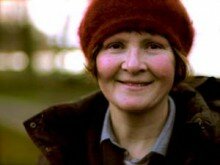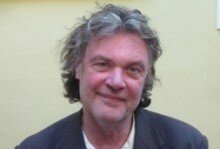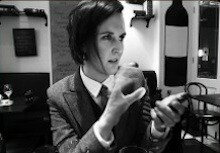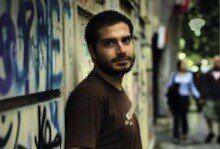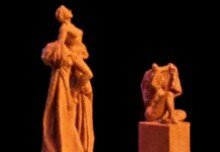Poetry in Motion
“Falling in love”, Lü De'an once declared in an interview, is what made him take up writing poetry. In this very recent interview with Zeng Hong, first published in Chinese in February 2003 on the Poemlife website, he elaborates on this and other questions, including significant influences on his work.
Zeng: What do you think poetry is? Please discuss your understanding of what poetry is basically about.
Lü: What is poetry? That's always a big question. As far as I'm concerned, poetry means that form of writing most capable of providing a motion internal to language, but in the broadest sense of form, it is becoming more and more difficult for us to define what poetry is. In my view, poetry is precisely that poetic kind of writing that is impossible to define but which gestures towards a certain possibility.
Zeng: What phases have you passed through in your writing? What have been the main characteristics and pursuits of these various phases?
Lü: Generally speaking, the years from 1979 to 1981 can be thought of as the years when I was just beginning to learn. Back then, I was studying commercial art at the Xiamen Arts and Crafts College, and the poem that most exemplifies that period is 'Women and the Nights of Wojiao'. Following that, from the end of the 1980s to the early 1990s, was another period. Let's say that in that phase I became relatively more self-conscious as a writer. By this time, I was doing advertising work for a book-store, and a string of my poems were being published, as well as my first poetry collections. The decade after that could be called my third phase. In that period, I spent one half of my time living in New York and the other in my home province of Fujian. Perhaps you could say that my creative work had reached the stage that Confucius called "standing firm". By that I mean that although, superficially, my individual style was becoming more and more mature, at the same time this implied a "lack of doubt". The features of the poetry of my earliest phase were like those of the many people who were eager to learn about poetry in those days—I was quite influenced by the experimental writing techniques of menglong or 'obscure' poetry. On the one hand, I worked hard to find novel subjects for my poetry, as well as lines of great compression and contrasts between bizarre images; I also strove to express a certain feeling of the modern. On the other hand, in terms of aesthetic taste, I was still extremely traditional—I myself think that this was a carrying of the legacy of traditional poetry as far as I understood it. In addition, pure poetry was another goal of my early writing. Actually, this was only really a matter of trying to create something new and original, trying out different ways of writing, most of it rather imitative. Ironically, the poem 'Women and the Nights of Wojiao' I mentioned before seemed to unfold in a relaxed, prose-like manner, and deviated from my views on pure poetry. In terms of its tone, it hinted at a certain direction or, to put it another way, it frequently served, in varying degrees, as a corrective and a guide once I'd embarked on my second phase. Gradually in my writing, I tended towards the expression of personal sentiments. Although there are in the poetry of this period clear traces of the lyricism of [the Russian poet] Yesenin as well as folk songs, the most important thing was that, realizing the charm of ordinary reality, I allowed my poetry to return to everyday language and everyday things. If the feature of the poetry of this period was its song-like quality, the predominant feature in the poetry I wrote after the 1990s was a narrative intonation and the pursuit a certain dramatic effect, only the themes were more concentrated and defined and, as a result, there was an intensification of the individual intonation—if you could call it an individual style, that is. On the whole, an important feature of my writing over the past 20 years is, from the perspective of life experience, delight, a delight which is always permeated with a kind of innocence or the arrogance of the self-taught.
Zeng: Have you met with any particular problems or difficulties in your writing? If so, how did you deal with them?
Lü: In a way you could say that writing is all about dealing with problems and difficulties. In my own writing, what is most important to me is the conditions of writing. If the conditions are right, when you start to write, everything will sort itself out accordingly.
Zeng: What are your most important influences? What kinds of poetry—ancient or modern, Chinese or Western—do you like and what influences have they had on you?
Lü: As someone who was born in the 60s of the previous century, and who grew up in the family of an ordinary office worker, the literary education I received in my early years was extremely limited. As far as classical poetry is concerned, from a young age I only managed to learn—imperfectly—a few poems off by heart, but still these classical writings always seem to be able to exert a subtle, moulding influence on one's character, and even through the gaps in language of that time, they revealed a certain contents, a certain rhythm—this was the impression of my youth. I couldn't memorize many poems, but the rhythm stayed with me. I think this fragmentary impression has influenced my understanding of poetry all along, and continues to do so even now. Words, images, rhythms. In the mid-1970s, when I was forced to leave high-school and go and settle in the countryside, I came across a battered old copy of Pushkin's poetry my sister had somehow got a hold of on one of my visits back home. The translation was by Zha Liangzheng, and was, I guess, my first contact with "foreign poetry" and, although I was left with any rhythm, it seemed to spark my youthful desires and—for the first time in the course of my very limited reading of literature—like some kind of heretic, I shut myself away in an atmosphere of worship. I went about this in secret, and it brought about changes: namely, I could carry on my love of poetry using another kind of language and, what's more, the direct, vernacular language of these translations was, after all, a more suitable vehicle for me to convey what was on my mind to a certain female student. While we're on the subject, I should mention that once in an interview, I was asked what made me take up writing and I said that it was falling in love that started it. I mean the same thing here. What I really want to say is that this collection of Pushkin's poetry was a concrete revelation to me. After that, what I really must mention is my reading a year later of some early poems by Shu Ting published in a magazine put out by the cultural centre in my hometown. The shock I felt on reading her majestic, exquisite lines was the same I received from Pushkin. I should point out that I mention Shu Ting not because I had the good fortune a year after that to get to know her personally, worshipping her as many of her admirers did, but because Shu Ting (a woman's voice) gave me the presentiment that something was about to happen, perhaps the sense that we were on the threshold of a new era (back in those days I paid little attention to the proclamation that the Cultural Revolution was over). It was only after I got to know Shu Ting that my presentiments were proved to be correct. Thanks to her, I began to read the Today! magazine, and poets such as Bei Dao and Mang Ke. I should mention that the influence of their poetry on me at that period in time was critical—it began to give me an awareness of language. Yes indeed, they dragged poetry back into the midsts of life, like a fresh breath of wind. To this day I still can't understand why people at the time called their poetry 'obscure'. Through Shu Ting, I also got to know Jin Haishu and Hei Dachun, my first poetry friends of my own generation. Jin Haishu, with his air of a student of philosophy, enlightened me in many ways, while Hei Dachun, with his love of wine, was like a messenger from the Beijing poets Bei Dao and Mang Ke and, although our acquaintance was brief, his vagrant, rebellious lifestyle and his frequent, spontaneous recitals of beautiful lines of poetry really opened my eyes and, more importantly still, he brought home to me an intense form of lyricism. What's more, he brought me the first two foreign poets I really loved: Yesenin and Lorca. As a result, these two became unerasable voices in my soul for a long time period of time after that. Of course, there were also poets such as Li Bai and Pablo Neruda. Robert Frost, who influenced me deeply in the 1990s, was my own discovery. I could make no less that ten lists of poets whom I have liked at different times with different degrees of intensity; their differences from one another [reflects] the constant variations in the goals I pursue in my writing, but what's even more important, such pursuits [enable] you to return constantly to your starting point, to return to a place that is honest to yourself. For me, Yesenin, drags my inspiration back to the small town-life of my childhood, while Lorca makes me fall in love with folk songs, from which I get a vague feeling of poetry's origins in music. As for Frost, he guides me on how to speak calmly and naturally when faced with everyday things. Of course, all these influences are brought about by different life experiences, but as I see it nowadays, irrespective of language, feelings or taste, I always seems to be forever returning to some kind of starting point. In addition, I must also add the influence of modern painting. If I've had any insights into the forms of language, I'd say the greater part of these have derived from my understanding of modern painting.
Zeng: What is your view of elements of poetry such as language, technique, the imagination etc.? When you write poetry, which are the elements you pay most attention to?
Lü: Poetry is a particular means by which we return to language. Different periods, and the different conceptions individuals have of the craft of poetry, maintain different understandings and objectives, but from the outset they always imply the inter-relationship of various elements, as well as hinting at a certain orientation, a certain tone, as well as a self-trascendence. It is these things that enable a poem to go on astonishing people. But without the effect of the imagination, none of these elements can cause surprise. Sometimes, I even feel that the deployment of technique is a part of the imagination. Good poetry always makes these elements appear in the most appropriate way, so for this reason, all I can really say is that when I write, what concerns me first and foremost is whether I've manage to make all these elements complement one another. This is not only a matter of technical control, but also a question of experience that enables you to understand how to maintain a certain sense of the proper limits, to comply with the self-sufficient orientation of language, thereby obtaining a certain naturally integrated effect.
Zeng: Do you incline more to poetry's intellectual nature or its artistic nature? To put it another way, how to handle the relationship between these two things?
Lü: I incline to the view that the poem is primarily a thing and not the representation of thought. 'Thought' in this case is a form of workmanship exterior to poetry; when you are confronted with a theme, thought is already present in it, expressing a concern for certain values, but a successful work is the successful transformation [of this thinking], one that enables it to become imagistically clear in the language of the poem. In my case, dispelling thought so that it becomes a deep-seated attitude towards—and interest in—things, or a kind of intention that cannot be put into words but which constantly permeates the "between the lines", is something that I strive hard to reach in my writing.
Zeng: What kinds of abilities or qualities do you think the poet ought to possess? Briefly summarize your views on these.
Lü: The power of imagination—everything else comes after that. They are matters to do with culture or comprehension. That's all I have to say.
Zeng: Please talk about your relationship as a poet with everyday reality. What effects does your life experience have on your writing?
Lü: Broadly speaking, writing itself implies a special relationship with reality. We all live in an extremely complex reality, and we are all without exception ordinary people. The thing is though, when you choose to pursue artistic creativity, there seems to be a greater sense of distance with respect to reality, making people sense more or less that you have a different orientation, while you yourself can easily become fatalistic—you have had no choice but to make your response to all this already. It seems that certain people are destined to produce certain kinds of things. When we look back over the past, we often feel that we have lost certain things, but sometimes it is not necessary to regret these losses—they are the result of past experiences. In the works of my early period there are certain innocent, straightforward qualities, like the feelings you had the first time you fell in love, but now there are other things that seem to arouse your interest more. What I mean is: what we write inevitably changes along with our lives. These changes—directly or indirectly—manifest themselves in between the lines of what you write. To talk about my own experience for a moment, when I was a little over thirty, I went to New York, where I lived what was in fact a very closed off and rather lost life. You could say that this was me taking a sniff on my own at a lonely life experience, something totally different from previous circumstances. At times like that, there is less of an exaggerated unbosoming of oneself in the things one writes, and more of an osmosis. Something indistinct. At this time, there were changes in my style. Nowadays, I often do physical work where I live in the mountains and this helps me to understand the original meaning of artistic creativity. If originally poetry simply meant making things, then going off and doing something else is also interesting. Starting off with this in mind can gradually help me go beyond all those various ambitious expectations outside of poetry while at the same time making me careful at all points about language, a feeling of respect.
Zeng: Please discuss the current situation of contemporary Chinese poetry and its future prospects. Also, what plans or expectations do you have for your writing now?
Lü: Up to the present day, the development of contemporary Chinese poetry has unavoidably gone through its own movements, and this in my view is quite normal. Not a few individuals have written poetry that possesses a true style. These styles make manifest to us the fundamental conditions of the various periods of the contemporary age. Although I have always taken exception to the phrase "mood of the times", I continue to believe even now that the avant-garde thinking implicit in [this phrase] is the main cause of various phenomena in contemporary Chinese poetry. Regardless of what the motives are for the promotion in poetry circles of so called 'popular' writing and 'intellectual' writing, both of these writings are the result of a shared spirit of experimentation. It seems as if everyone dreams of creating an utterly unique text. But that miracle can only ever happen to individuals. Yu Jian's File 0 is an example of genius from the past few years. Its artistic power and enormous sense of reality gives one an impression that what Yu Jian has been through and what our age has been through are exactly the same thing. Then there is Han Dong's Jia-yi, a profound work that would seem to prove that his catch-phrase "poetry has its end in language" exerts its influence over a still younger generation.


